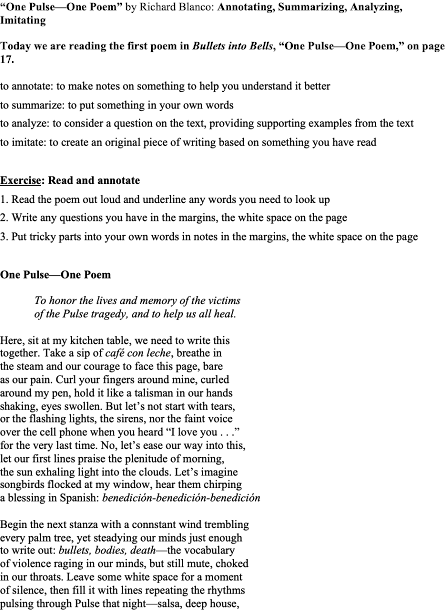Week 31: College Reading and Writing: Philip Levine
Week 31:
College Reading and Writing: Philip Levine
Philip Levine:
Annotating, Summarizing, Analyzing, Imitating
to annotate: to make notes on something to help you
understand it better
to summarize: to put something in your own words
to analyze: to consider a question on the text, providing
supporting examples from the text
to imitate: to create an original piece of writing based on
something you have read
We are doing a poem from a handout. The poem is called “What
Work Is.”
Exercise: Read and annotate
1. Read the poem and response out loud and underline any
words you need to look up
2. Write any questions you have in the margins or in your
notebook
3. Put tricky parts into your own words in notes in the
margins or in your notebook
Exercise: Questions for Comprehension of the poem
1. Who is the
“we” in the first line? Who is the “you” in the third line?
2. What is the
“sad slouch” about?
3. What is
significant about “what work is” in the last line?
Exercise: Summarize the poem
Write a
paragraph summarizing the poem with quotations, in-text citation, and a Work
Cited Page.
example too-short summary, incorporating quotation
and in-text citation:
Kyle
Dargan’s poem “Natural Causes” tells the story of a boy who purchases a gun
“from a farm in Virginia” (31) from a farmer who “keeps his gaze down as to
remember nothing of the boy’s face” (31). The speaker of the poem insinuates
that the farmer has sold guns to other boys like this one, when they say, “His
customers rarely return older” (31).
Work Cited Page (for
today’s poem)
Levine,
Philip. “What Work Is.” Alfred A. Knopf, 1991.
Exercise: Using the responses in the book as a model,
write your own response to “What Work Is.” Include your own work experience and
tie it back to the poem.
Exercise: Summarize the response
Write a
paragraph summarizing the response with quotations, in-text citation, and a
Work Cited Page.
Exercise: Analysis
Question for
analysis: The title of this poem suggests a definition for work. It goes on to
describe men who have a “sad slouch” and a “love flooding.” These two details
add physical and emotional layers to the poem. In your analysis, using the
images from the poem, write about what work means to Levine and how it affects
the speaker of this poem, both physically and emotionally.
Exercise: Imitation
Write a poem about what work means to you.
Homework:
- Summary of
Poem
- Summary of
Response
- Analysis of
Poem and Response
- Imitation of
Poem
About this class:
In this class, you are welcome to
submit homework for a grade. If it’s not
strong enough to earn an A, I’ll give you some comments to help you revise it,
and let you do it over again. You have as many chances as you want to complete
and perfect the work in this class, and you are welcome to do more than one
week’s worksheet for homework at a time; ask me for sheets you’ve missed. Students who complete 15 weeks of graded assignments
and a longer paper can qualify for college credit. When you get close to completing 15 weeks,
I’ll help you get started on your longer paper.


Comments
Post a Comment